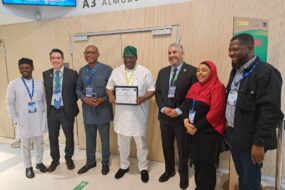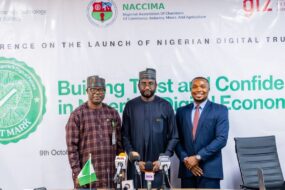
By Iseoluwa Asaolu
In a study titled “All‑On Off‑Grid Energy Business Report”, Nextier surveyed 21 off‑grid mini‑grids across Nigeria, funded by the All‑On initiative. The findings highlighted that insecurity and vandalism of energy infrastructure, such as attacks on mini‑grids, drive up power costs and limit access to electricity in rural areas. These security challenges significantly strain the off‑grid market and hinder scalability. This article explores how energy systems are closely connected with national and human security.
Across the world, concerns over the reliability of energy services have shaped public expectations, influenced political decisions, and sparked conflict. Where energy fails, insecurity often follows, ranging from the risk of armed conflict to the resilience of national economies and the stability of political systems. Nigeria has the largest population of people without access to electricity in the world. As of 2024, an estimated 90 million Nigerians, over 40 per cent of the population, live without reliable electricity. While major cities like Lagos and Abuja enjoy relatively better coverage, rural areas and urban slums experience power cuts that last for days, sometimes weeks. In many rural and peri-urban communities, residents live without streetlights, powered police posts, or even the ability to charge a mobile phone. In such conditions, criminal activity becomes easier to commit and harder to detect or report.
Energy poverty contributes to insecurity in multiple, overlapping ways. The first and most immediate is through physical vulnerability. Street lighting is one of the most effective deterrents to urban crime. Yet in thousands of Nigerian towns and villages, road networks remain unlit. The second link is institutional. Law enforcement and emergency services depend on energy to operate effectively. When police stations lack power, their response capacity is compromised, and their communications equipment may fail. Data records, CCTV systems, and even basic lighting become luxuries. The third and arguably most damaging link is social and economic exclusion. In many parts of Nigeria, especially the North and the Niger Delta, a lack of electricity severely limits employment opportunities. Youth are disproportionately affected. Opportunities are limited when there is no access to energy for digital tools, small-scale enterprises, or vocational training. This frustration, coupled with economic hardship, can lead to crime, radicalisation, and migration.
Insurgencies such as bandit groups in the northwest have exploited such environments. They offer money, food, or protection to young people abandoned by the state. In return, they gain loyalty, recruits, and territory control. Often, these are areas where government infrastructure, especially electricity, has never reached. Recent developments underscore how deeply energy access is intertwined with national and human security. In Rivers State, widespread pipeline vandalism led President Bola Tinubu to declare a state of emergency. According to Reuters Energy, “the Trans-Niger pipeline, which carries 180,000 barrels per day, was shut after multiple explosions,” prompting President Tinubuto suspend state authorities and deploy federal forces. The gravity of the disruption not only threatened national oil revenue but also exposed the vulnerability of Nigeria’s energy infrastructure to sabotage and criminal exploitation. “Energy security is national security,” said NNPC Group CEO Mele Kyari, highlighting the urgent need to secure energy assets as part of broader state stability efforts. Meanwhile, in March 2025, the Federal Government of Nigeria, through the Rural Electrification Agency (REA), signed a $200 million deal with WeLight to deploy over 400 solar mini-grids across underserved communities. This move, expected to connect nearly two million people, is framed as an economic and security imperative. “Electrifying rural Nigeria is not just about development, it’s about inclusion and resilience,” said Minister of Power, Adebayo Adelabu.
At the policy level, the Federal Executive Council approved the National Integrated Electricity Policy (NIEP) in May2025, a landmark framework that aims to unify Nigeria’s fragmented energy planning. The Strategic Implementation Plan (SIP) is central to its implementation, as it outlines actionable pathways to accelerate electricity access and address regional disparities. By promoting coordinated investments across grid, off-grid, and mini-grid systems, the NIEP-SIP prioritises last-mile electrification in underserved and conflict-prone communities. Expanding energy access through this integrated approach fosters local economic development and addresses energy poverty, a critical driver of insecurity. Reliable electricity empowers rural enterprises, enhances public service delivery, and improves security infrastructure, thereby reducing dependence on alternatives like diesel generators. Legislators echoed this need for coherence at the Renewable Energy Legislative Conference. Speaker Tajudeen Abbas stated: “Without a strong legal foundation for our energy transition, we risk fueling deeper inequality and insecurity.”
However, the link between energy and insecurity is not unique to Nigeria. Across many parts of sub-Saharan Africa and other developing regions, unreliable or insufficient access to electricity has contributed to widespread economic stagnation, social unrest, and conflict. In countries like the Democratic Republic of Congo, South Sudan, and parts of the Sahel, energy poverty has increased tensions by limiting access to livelihood opportunities, education, and basic amenities. In 2025, the African Development Bank warned that energy subsidy removals in Kenya, Angola, and Nigeria could trigger unrest. “Energy prices are not just economic, they are political and social,” an AfDB report stated. “Poorly managed reforms risk mass protest or conflict.” Meanwhile, the International Renewable Energy Agency (IRENA) and Accelerated Partnership for Renewables in Africa (APRA) report at the APRA Investment Forum in Nairobi that most African renewable energy projects fail to secure funding, not for technical reasons but due to instability, poor governance, and high investor risk.
Electrification: A Practical Pathway to Peace
Despite these challenges, electrification offers a clear and attainable pathway to increased security. Studies across Africa and other parts of the world consistently show that improving access to electricity reduces petty and organised crime. In Kenya, rural electrification programmes led to a 25% drop in nighttime crime in connected areas. In India, improved access to grid electricity was associated with a significant decline in violent crime against women. In Brazil, streetlight upgrades in favelas contributed to improved community-police relations and crime reduction.
In Nigeria, although data is less systematically tracked, several state-level and NGO-led initiatives have already shown promise:
• In Kaduna State, the installation of solar-powered streetlights in major markets and transit corridors has been linked to a decrease in robbery and assault cases.
• In Maiduguri, solar mini-grids have been deployed in IDP camps and surrounding areas to improve night-time visibility, support health clinics, and strengthen communication between residents and local security forces.
• In Lagos, pilot projects providing off-grid electricity to informal settlements have improved safety and enabled more women to run small businesses after dark.
The benefits extend beyond safety. Electrification supports economic revitalisation, improves education outcomes, and fosters civic participation. An electrified community is a more stable, connected, and productive one.
The Role of International Actors and Peacebuilding Frameworks
The importance of energy access in fragile and conflict-affected regions is now gaining recognition at the global level. Energy is increasingly being viewed as both a preventive and restorative peacebuilding tool. Under the Sustainable Development Goals (SDGs), Goal 7 (affordable and clean energy) and Goal 16 (peace, justice, and strong institutions) are closely intertwined. Yet funding mechanisms and implementation strategies still treat them in isolation. That must change. Organisations such as the Global Energy Alliance for People and Planet (GEAPP), USAID’s Power Africa, the UN Peacebuilding Fund and the World Bank’s Lighting Africa program have begun integrating electrification into peacebuilding and development projects. These efforts are helping to connect off-grid communities, support local businesses, and demonstrate state presence in areas vulnerable to extremist control.
However, more coordinated and sustained action is needed. The international community must recognise that supporting Nigeria’s energy transition is a climate or economic imperative and a security investment with global benefits.
Policy Imperatives: A National Security Strategy for Electrification
Electrification must be approached as a strategic national priority with direct implications for security and stability. By embedding security considerations into national electrification planning, Nigeria can extend state presence, reduce the appeal of non-state actors in underserved areas, and mitigate long-standing drivers of insecurity. Key priorities should include:
• Classify rural electrification and street lighting as essential security infrastructure, not just development projects.
• Deploy decentralised, renewable energy systems (e.g., solar mini-grids, standalone systems) that are less vulnerable to sabotage and more adaptable to off-grid locations.
• Strengthen partnerships between the Ministry of Power, security agencies, and local governments to ensure coordination in planning and deployment.
• Leverage climate finance and donor support to close funding gaps and prioritise impact in conflict-affected areas.
• Monitor and evaluate the link between energy interventions and crime reduction, to inform data-driven policy adjustments.
The challenges of insecurity in Nigeria are complex and multifaceted. But the absence of electricity in millions of homes, schools, clinics, and public spaces is a common thread. Electrification alone will not solve the country’s security problems, but through peace and protection. A nation cannot secure what it does not have the power to protect. As Nigeria and its global partners work toward a more secure, inclusive future, the time has come to treat electricity as a driver of growth and a pillar of peace. To protect communities, Nigeria must power them.
(Iseoluwa Asaolu is a Communications Intern at the Electricity Hub)
















